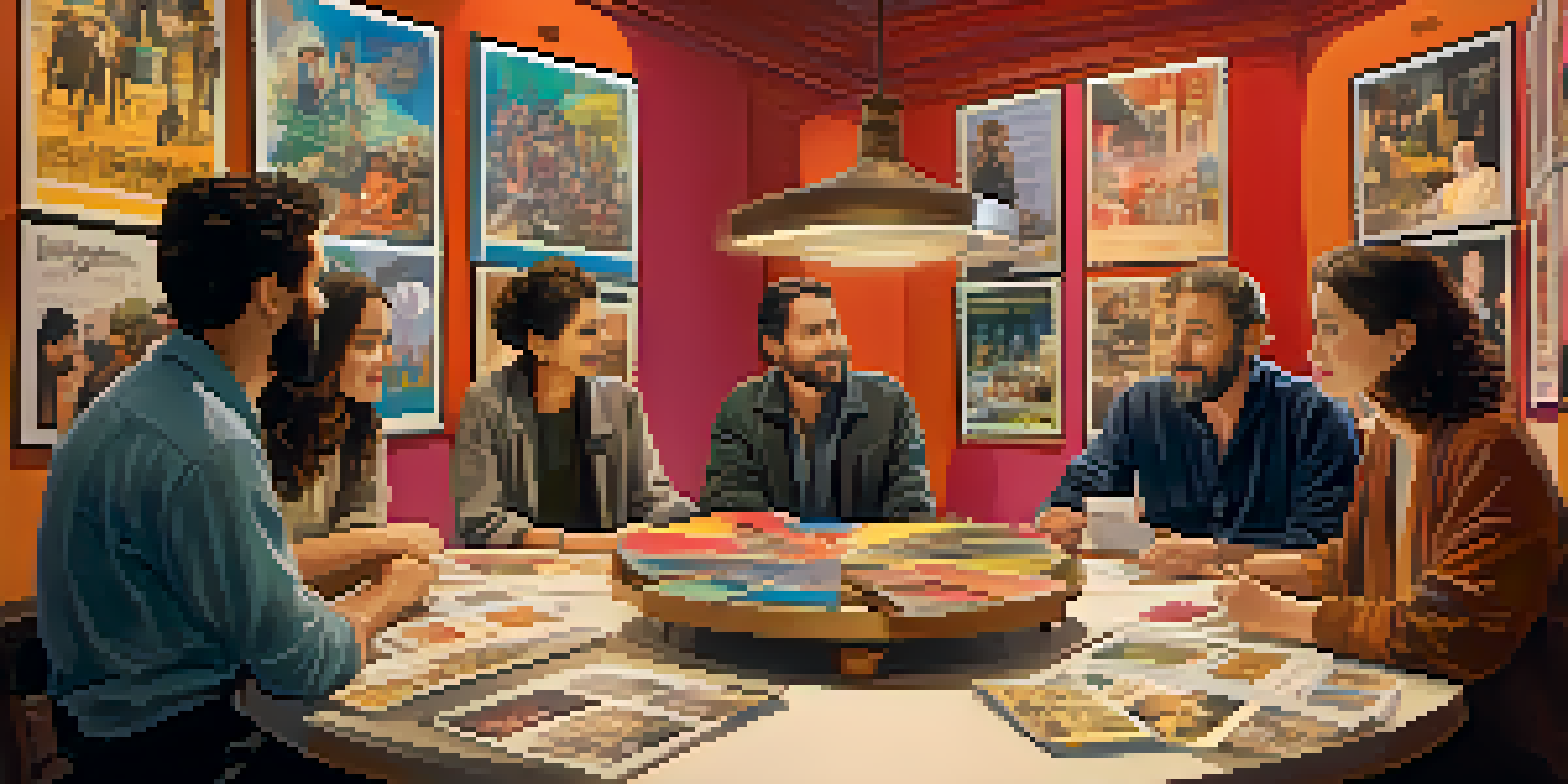Judaism in Film: Representation and Misrepresentation

The Historical Context of Jews in Cinema
The representation of Jews in film is deeply rooted in history, often reflecting societal attitudes at the time. Early cinema frequently depicted Jewish characters through negative stereotypes, fueling misconceptions. For instance, silent films often portrayed Jews as greedy or villainous, which set a troubling precedent for future portrayals.
Cinema is a mirror of society, reflecting its values, beliefs, and biases.
As Hollywood evolved, these representations began to shift, albeit slowly. The emergence of Jewish filmmakers in the mid-20th century started to provide a more nuanced view of Jewish life and culture. This change highlighted the importance of authentic storytelling, allowing for a richer exploration of Jewish identity and experience.
However, the remnants of these earlier stereotypes can still be seen today. Many films continue to oscillate between genuine representation and outdated caricatures, making it crucial to analyze how these portrayals influence public perception.
Stereotypes in Jewish Representation
Stereotypes in film can be both overt and subtle, often shaping viewers' understanding of Jewish culture. Common tropes include the 'money-hungry Jew' or the 'nebbish' character, which oversimplify the vast diversity within the Jewish community. Such portrayals not only distort reality but also perpetuate harmful biases.

These stereotypes can have real-world consequences, impacting societal attitudes toward Jewish people. For example, the reinforcement of these negative images can lead to discrimination and social exclusion. It’s vital to recognize that films can shape beliefs, sometimes more powerfully than historical facts.
Changing Jewish Representation in Film
The portrayal of Jews in cinema has evolved from negative stereotypes to more nuanced and authentic representations, reflecting the complexities of Jewish identity.
Conversely, some filmmakers have challenged these stereotypes, aiming to present more complex, relatable Jewish characters. Films that delve into the intricacies of Jewish life can foster understanding and empathy, ultimately breaking down barriers created by misinformation.
Notable Films and Their Impact
Several films have made significant strides in how Judaism is represented, affecting both Jewish and non-Jewish audiences. Take 'Schindler's List,' for example; it not only depicts the Holocaust's horrors but also humanizes Jewish characters, offering a poignant narrative about resilience. This film shifted conversations around Jewish identity and trauma in mainstream cinema.
The power of film is its ability to create empathy, to draw us into the lives of others.
Similarly, 'A Serious Man' by the Coen Brothers provides a unique lens into Jewish life, exploring themes of faith and existential doubt. By capturing the nuances of a Jewish family's struggles, the film resonates with audiences, regardless of their backgrounds. Such films invite viewers to engage with Jewish culture on a deeper level.
While many films have positively contributed to representation, others have missed the mark. Understanding the impact of these portrayals is essential, as they can either reinforce stereotypes or promote a more authentic narrative.
Jewish Identity and Intersectionality in Film
Jewish identity is not monolithic; it encompasses a wide range of experiences and backgrounds. In film, this intersectionality can be explored through various lenses, including race, gender, and sexuality. Films like 'The Hebrew Hammer' showcase the diversity within Jewish culture, blending humor with social commentary.
By highlighting different aspects of Jewish identity, filmmakers can provide a richer tapestry of experiences. This approach not only broadens representation but also fosters dialogue about the complexities of Jewish life in contemporary society. It encourages audiences to reflect on their own identities in relation to others.
Impact of Filmmakers on Narratives
Jewish filmmakers like Spielberg and the Coen Brothers play a crucial role in shaping authentic narratives, drawing from personal experiences to counter stereotypes.
Films that embrace intersectionality can challenge the status quo, pushing against traditional narratives. They open up space for underrepresented voices within the Jewish community, reminding us that every story matters.
The Role of Jewish Filmmakers
Jewish filmmakers have played a crucial role in shaping the narrative around Jewish representation in cinema. Directors like Steven Spielberg and the Coen Brothers have used their platforms to tell stories that reflect their cultural heritage authentically. Their works often blend personal experiences with broader themes, creating relatable narratives that resonate widely.
Moreover, the presence of Jewish filmmakers often leads to more accurate portrayals of Jewish life, as they draw from their own experiences and histories. This insider perspective is invaluable in countering stereotypes and promoting understanding. It underscores the importance of representation behind the camera as much as in front of it.
However, the industry still has room for growth. Encouraging diverse voices within the Jewish community can lead to a richer array of stories, ensuring that all aspects of Jewish life are represented on screen.
The Future of Jewish Representation in Film
As society evolves, so too does the landscape of film representation. There is a growing demand for authenticity and diversity in storytelling, pushing filmmakers to reconsider how they portray Jewish characters and narratives. This shift opens the door for more nuanced and varied representations of Jewish life.
The rise of streaming platforms has also contributed to this evolution, offering independent filmmakers a platform to share their stories. Films that might have struggled to find a home in traditional theaters can now reach wider audiences, facilitating new conversations about Jewish identity. This democratization of content is promising for the future of representation.
Audience Engagement Shapes Perception
The way audiences engage with Jewish films influences cultural perceptions, fostering empathy and understanding while challenging harmful stereotypes.
Ultimately, the future of Jewish representation in film will depend on continued advocacy for diverse voices and stories. As audiences become more engaged and vocal about the narratives they want to see, filmmakers will be challenged to rise to the occasion.
Audience Reception and Cultural Impact
The way audiences receive Jewish films plays a significant role in shaping cultural perceptions. Positive portrayals can foster empathy and understanding, while negative representations often lead to perpetuated stereotypes. Audience engagement, whether through social media or film discussions, can influence how these narratives are interpreted.
For instance, films that challenge stereotypes often generate conversations that extend beyond the screen. When viewers discuss their reactions to a film, they contribute to a larger dialogue about identity, representation, and social justice. This engagement is essential in creating a more informed audience.

Furthermore, the cultural impact of these films can lead to increased visibility for Jewish voices in other media. As filmmakers continue to push boundaries and tell authentic stories, they pave the way for future generations to explore and share their own narratives.